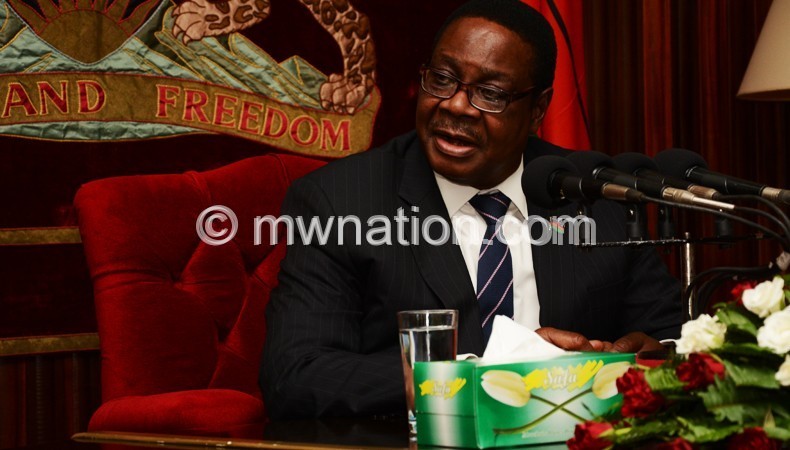APM rolls out ambitious agenda
Facing a crumbling economy and potential social crisis, President Peter Mutharika last night recited a litany of public investment programmes aimed at salvaging the country.
However, in his national address monitored on taxpayer-funded Malawi Broadcasting Corporation (MBC), the President apparently fell short of outlining a road map on how the same would be financed.

While acknowledging the challenges facing the country, including persistent water and electricity supply hiccups, the President said accepting the presence of problems was the first step in solving them.
In the 35-minute long address, Mutharika admitted that the country has, over the past few years, experienced serious challenges that have negatively affected lives of people, particularly the poor.
This was Mutharika’s second address to the nation after his State of the Nation Address (Sona) which he presented in Parliament in May this year.
He said: “I know the pain most of us have been feeling. But I also understand our impatience to urgently get out of our challenges because this nation has suffered in poverty for many years.
“We are all tired of being a poor country. I hear the silent voices of those who cannot speak; and I can understand the feeling of those who want Malawi to change overnight. But in our silent voices and urgent feelings, I see our collective will to use our challenges as a collective motivation to pursue long-term solutions. I only ask for one thing: to focus on the real issues.”
Mutharika said the challenges facing the country are not insurmountable as they can be overcome through unity of purpose.
On general performance of the economy, Mutharika observed that the economic gains achieved up to early 2015 had been reversed with the real gross domestic product (GDP) growth of 6.2 percent recorded in 2014 declining to 3.2 percent in 2015 while in 2016 it is projected to decline further to 2.8 percent.
Similarly, the President said the stabilising trend in the exchange rate and the interest rates was reversed, but the country was still maintaining high foreign exchange reserves, the highest in its history since independence.
On food security, the President said most families were experiencing acute food shortage but insisted that “no one will die from hunger” because government has bought enough maize and other food stuffs for free distribution to the poorest and the most vulnerable people.
He said government was also collaborating with development partners to implement a plan aimed at permanently breaking the cycle of food insecurity in the country.
Malawi is currently experiencing its worst food insecurity crisis in over a decade with about 8.4 million people affected, including 6.7 million in need of humanitarian assistance.
The food crisis is attributed to the effects of El Niño weather conditions the country experienced during the last growing season.
In April this year, Mutharika declared a state of national disaster and government, in collaboration with humanitarian partners, developed a 2016/17 Food Insecurity Response Plan to guide the response program.
The total budget for the Response Plan was $395.13 million out of which $307.5 million will go towards ingassist the affected people with relief food.
Already, government, using its own resources and support from partners, has sourced a total of 276 742 metric tonnes of humanitarian relief maize that will cater for all the food insecure people needing humanitarian food assistance.
Turning to water shortages and electricity blackouts, the President noted that the problem was affecting people’s lives in many ways.
However, he blamed past leaders for failing to invest to expand water and electricity generation for many years which he said was what his administration was trying to change.
He said so far, government is taking urgent measures to address the water shortage and make the problem a history through a number of initiatives such as rehabilitation of Mudi Dam in Blantyre, and procurement of heavy duty generators for Blantyre stations to avert the frequent power outages.
Mutharika also mentioned the yet-to-be launched project that will be tapping water from Lake Malawi to Lilongwe and some parts of Salima and Dowa, among others.
He also outlined a number of short term and long term measures aimed at generating sufficient amount of energy to meet the economic and social demands.
Among them were, procurement of 46 megawatts (MW) diesel peaking generators which will be ready for use in Lilongwe and Mzuzu, acquiring of 78 MW of Emergency Power Plant by Electricity Supply Corporation of Malawi (Escom) on lease basis for an initial estimated period of 18 months and procurement of 70 MW of PV Solar power from Independent Power Producers (IPPs).
In the long-term, the President said a number of IPPs have expressed interest to invest in power production using solar technology and the Power Purchase Agreements (PPAs) are being signed soon.
The President also highlighted some of the measures put in place in a bid to address the challenges in the health sector, particularly with regard to the shortfall of drugs and equipment as well as inadequate medical personnel.
He said government has awarded procurement contracts of over K10 billion for medicines whose deliveries are expected in the coming weeks.
Additionally, he said government has invested in drug storage systems both at facility and central levels with support from the United States and United Kingdom governments where 115 prefabricated drug storage units have been installed across the country.
Government is also recruiting health workers who have just graduated from the College of Medicine with about 1 440 of them being targeted.
Out of this figure, processes have already been done to recruit 960 across all cadres under the Global Fund and Pepfar.
The President also outlined government’s plans on education, land reforms, education, national security, public sector reforms and fight against corruption which he observed remained a big challenge in government.





